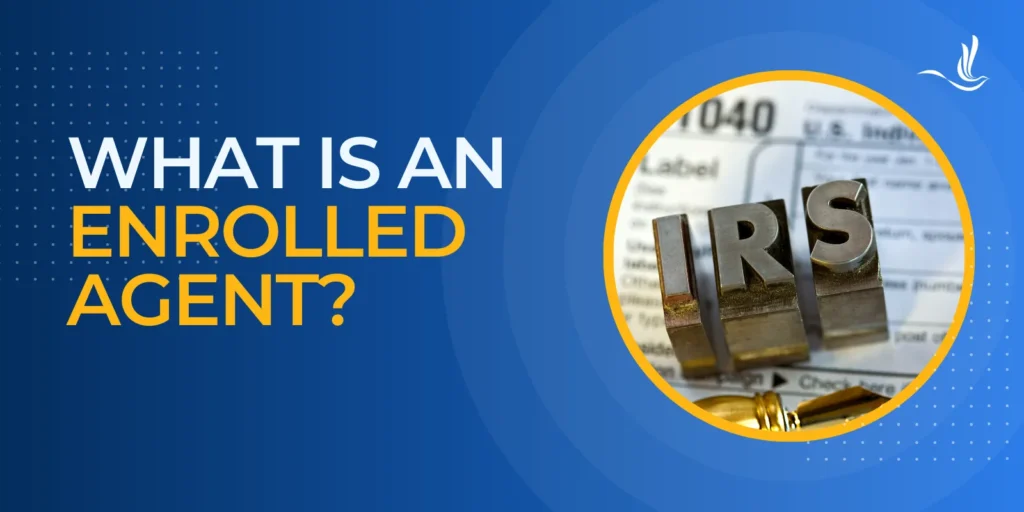
We often hear that the tax professionals qualified to represent you before the IRS are CPAs, tax attorneys, and enrolled agents. While the first two roles are more well-known, many are still confused about what exactly an enrolled agent is. An Enrolled Agent (EA) is a federally authorized tax practitioner who has technical expertise in the field of taxation. Enrolled agents are empowered by the U.S. Department of the Treasury to represent taxpayers before the IRS for audits, collections, and appeals. They are the only taxpayer representatives who receive their right to practice from the federal government. Here is an overview of enrolled agents, including what it takes to become one, how they differ from CPAs and tax attorneys, and the advantages of hiring one for help with the IRS.
The Role and Responsibilities of an Enrolled Agent
Enrolled agents are equipped to handle a wide range of tax matters. Some of their key responsibilities include the following.
Tax Preparation
EAs are tax experts who assist individuals, businesses, and other entities with preparing and filing their tax returns. They can navigate complex tax situations and ensure compliance with tax laws.
Tax Planning
EAs help clients make strategic decisions to minimize their tax liability. This may involve advising on investment strategies, retirement planning, or business decisions that have tax implications.
Representation
One of the primary roles of an enrolled agent is to represent taxpayers before the IRS. EAs can advocate on behalf of their clients during audits, appeals, and collections. They can also negotiate with the IRS to resolve issues such as back taxes or penalties.
Compliance
EAs help clients understand their tax obligations and ensure they comply with federal and state tax laws. This includes advising on record-keeping, reporting requirements, and other tax-related matters.
How Does One Become an Enrolled Agent?
Clearly, enrolled agents carry a lot of responsibility and authority. That said, it’s important to note that there are two primary paths to becoming an enrolled agent.
- Pass the Special Enrollment Examination (SEE): This is a comprehensive three-part exam that covers individual and business tax laws, IRS practices and procedures, and various representation issues. The SEE is designed to test a candidate’s knowledge of the Internal Revenue Code and its application to various tax scenarios.
- IRS Experience: Individuals who have worked for the IRS for at least five years in a position that regularly required the interpretation and application of the tax code can also become enrolled agents. Their IRS experience serves as evidence of their knowledge and expertise in the field.
After becoming an EA, individuals must complete continuing education courses to maintain their status. This requirement ensures that EAs stay up-to-date with the ever-changing tax laws and regulations.
How Do Enrolled Agents Differ from CPAs and Tax Attorneys?
While enrolled agents, Certified Public Accountants (CPAs), and tax attorneys can all represent taxpayers before the IRS, there are key differences in their training and areas of expertise. Enrolled agents specialize in taxation and have a deep understanding of the tax code. Their primary focus is on tax preparation, planning, and representation. CPAs are accountants who have passed a state licensing examination. They offer a broader range of services, including auditing, accounting, and financial planning, in addition to tax services. Not all CPAs specialize in taxation, but those who do often provide similar services to EAs. Tax attorneys are lawyers who specialize in tax law. They are well-versed in legal issues related to taxes, such as tax disputes, litigation, and estate planning. Tax attorneys are often sought for complex legal matters and can represent clients in tax court.
The Advantages of Hiring an Enrolled Agent
There are several benefits to working with an enrolled agent.
- Tax Expertise: EAs have comprehensive knowledge of tax laws and are required to stay current with the latest changes, making them well-equipped to handle complex tax issues.
- IRS Representation: EAs have the authority to represent taxpayers before the IRS, providing a layer of protection and advocacy during audits and disputes.
- Nationwide Practice Rights: Unlike CPAs and attorneys who may be limited to practice in specific states, EAs are federally authorized and can practice in any state, providing flexibility for clients with multi-state or national tax concerns.
Tax Help for Those Dealing with the IRS
Enrolled agents are highly qualified tax professionals who specialize in taxation and have the unique authority to represent taxpayers before the IRS. Whether you need assistance with tax preparation, planning, or navigating an audit, an EA can provide expert guidance and representation tailored to your specific needs. Optima Tax Relief has a team of knowledgeable tax professionals, including enrolled agents and tax attorneys, with experience helping taxpayers with tough tax situations.
If You Need Tax Help, Contact Us Today for a Free Consultation